Squeezing reading around long working hours isn’t ideal. Here are a few books I’ve crammed into the late-night nooks and crannies of my crazy life.
This Water: Five Tales by Beverley Farmer
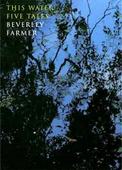 Vale Beverley Farmer. Farmer’s first books Alone, Milk and The House in the Light were magical to me: her way with words exquisite. Since 1980, I’ve been a devotee. This Water: Five Tales, her final book, carries the same detailed and delicate observation of the natural world, and especially of the coast and the sea. Even if this book is not Farmer’s finest work, it was enough for me to have her voice and sensibility back in my life for a little while. It’s been really strange since I heard of her death on April 16. I see myself on a beach on a blustery day searching for something along the shore but not being able to find it. Still, I’m glad her long battle with Parkinson’s Disease is over. I also celebrate her amazing contribution to Australian life and literature, and I urge you to read about her legacy in Ivor Indyk’s poignant eulogy.
Vale Beverley Farmer. Farmer’s first books Alone, Milk and The House in the Light were magical to me: her way with words exquisite. Since 1980, I’ve been a devotee. This Water: Five Tales, her final book, carries the same detailed and delicate observation of the natural world, and especially of the coast and the sea. Even if this book is not Farmer’s finest work, it was enough for me to have her voice and sensibility back in my life for a little while. It’s been really strange since I heard of her death on April 16. I see myself on a beach on a blustery day searching for something along the shore but not being able to find it. Still, I’m glad her long battle with Parkinson’s Disease is over. I also celebrate her amazing contribution to Australian life and literature, and I urge you to read about her legacy in Ivor Indyk’s poignant eulogy.
Giramondo, $26.95
A Spool of Blue Thread by Anne Tyler
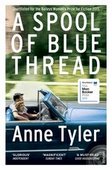 ‘“It was a beautiful, breezy, yellow-and-green afternoon,” she’d begin, and it would all come back to her—the newness of it, the whole new world magically opening before her at the moment when she first realised that this person that she’d barely noticed all these years was, in fact, a treasure.’ She is Abby, and he is Red, and this is their love story. It is also the story of the house they inhabit, the family they raise, and their everyday triumphs and trials. Four generations of Whitshanks inhabit the sprawling Baltimore house and it holds their complexities, rivalries, dreams and desires like a jug holds water. Tyler’s 20th book (and she says it’s her last) is worthy of its shortlisting for the Man Booker Prize, the Baileys Women’s Prize for Fiction, and its New York Times Bestseller status.
‘“It was a beautiful, breezy, yellow-and-green afternoon,” she’d begin, and it would all come back to her—the newness of it, the whole new world magically opening before her at the moment when she first realised that this person that she’d barely noticed all these years was, in fact, a treasure.’ She is Abby, and he is Red, and this is their love story. It is also the story of the house they inhabit, the family they raise, and their everyday triumphs and trials. Four generations of Whitshanks inhabit the sprawling Baltimore house and it holds their complexities, rivalries, dreams and desires like a jug holds water. Tyler’s 20th book (and she says it’s her last) is worthy of its shortlisting for the Man Booker Prize, the Baileys Women’s Prize for Fiction, and its New York Times Bestseller status.
Penguin Random House, $22.99
Eleanor Oliphant is Completely Fine by Gail Honeyman
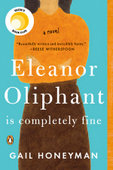 What a delightful book! I had no idea that Eleanor Oliphant with her painful past and and social awkwardness would captivate me as she did. Her newfound pal Raymond is also one of the sweetest fellows you’ll meet in fiction — and he needs to be if he’s going to help Eleanor, whose armour of self-sufficiency is almost impenetrable. This is a novel about loneliness, how to heal after childhood trauma, and how kindness can be transformative. You will love the way Eleanor looks at the world and applaud her impatience with society’s silly conventions. Although she’s deeply wounded by what happened to her as a child, she’s also funny. I’m not surprised that Eleanor Oliphant is Completely Fine won the Costa First Novel Award and the British Book Awards Book of the Year, was shortlisted for the Lucy Cavendish College Fiction Prize, the Desmond Elliot Award, and the Author’s Club Best First Novel, and was long-listed for the Women’s Prize for Fiction.
What a delightful book! I had no idea that Eleanor Oliphant with her painful past and and social awkwardness would captivate me as she did. Her newfound pal Raymond is also one of the sweetest fellows you’ll meet in fiction — and he needs to be if he’s going to help Eleanor, whose armour of self-sufficiency is almost impenetrable. This is a novel about loneliness, how to heal after childhood trauma, and how kindness can be transformative. You will love the way Eleanor looks at the world and applaud her impatience with society’s silly conventions. Although she’s deeply wounded by what happened to her as a child, she’s also funny. I’m not surprised that Eleanor Oliphant is Completely Fine won the Costa First Novel Award and the British Book Awards Book of the Year, was shortlisted for the Lucy Cavendish College Fiction Prize, the Desmond Elliot Award, and the Author’s Club Best First Novel, and was long-listed for the Women’s Prize for Fiction.
Penguin Books, $16.00
Lullaby by Leila Slimani
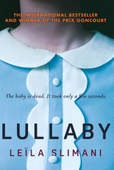 Surely this is every parent’s nightmare? You engage a nanny to look after your precious bundles of joy, and in small increments the nanny’s mental instability surfaces. You’re living at breakneck speed and (almost) too busy to notice. When you do sense something strange, you try to convince yourself and your partner that it’s nothing because you really need this nanny to work out well. In this disturbing novel, Louise (the nanny) burrows herself into this Parisian family like a tick. As time passes, she knows that Myriam and Paul’s kids will soon no longer need her, so she becomes obsessed with them having another baby. When she realises this is not going to happen the terrifying end is set in motion. Slimani has created a truly truly chilling character in Louise, and her book speaks with clarity about the ‘charmed obliviousness – of ruling class to underclass’ (as Catherine Ford so succinctly put it). Translated from the French by Sam Taylor, Lullaby was the most read book in France in 2016, is an international bestseller, and won France’s prestigious literary prize, the Prix Goncourt. There’ll be a film … but read this first, its prose is pitch perfect.
Surely this is every parent’s nightmare? You engage a nanny to look after your precious bundles of joy, and in small increments the nanny’s mental instability surfaces. You’re living at breakneck speed and (almost) too busy to notice. When you do sense something strange, you try to convince yourself and your partner that it’s nothing because you really need this nanny to work out well. In this disturbing novel, Louise (the nanny) burrows herself into this Parisian family like a tick. As time passes, she knows that Myriam and Paul’s kids will soon no longer need her, so she becomes obsessed with them having another baby. When she realises this is not going to happen the terrifying end is set in motion. Slimani has created a truly truly chilling character in Louise, and her book speaks with clarity about the ‘charmed obliviousness – of ruling class to underclass’ (as Catherine Ford so succinctly put it). Translated from the French by Sam Taylor, Lullaby was the most read book in France in 2016, is an international bestseller, and won France’s prestigious literary prize, the Prix Goncourt. There’ll be a film … but read this first, its prose is pitch perfect.
Allen & Unwin, $27.99
The Art of Disappearing by Elisabeth Hanscombe
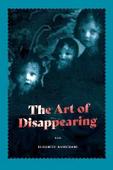 Candour and vivid detail help drive this powerful memoir about how a daughter survives her sexually abusive and alcoholic father. By the age of 19, Elizabeth has lived in 10 homes — the first of which she says was a chook shed. Her family was so poor, she writes, ‘the debt piled up in our house like dirty washing’. Her teeth rot for years and she bears the pain with such stoicism it’s frightening. It’s also a signal that this girl is a survivor. Her father wields a terrible force in the household just by his presence, which is highly volatile. The terror is palpable when he’s violent, when he sneaks into his children’s beds, and as he fondles them inappropriately in his creepy photography sessions. Once, when he’s abusing his wife, the police come to the house but they say there’s nothing they can do because it’s ‘a domestic’. As if all this is not enough for Elizabeth to deal with, she is out one day and a man bribes her to shake his penis to bring him to orgasm. At home, when she talks about the incident, her mother tells her she must go to confession, where the priest tells her to recite three Hail Marys. This is the same world in which, ‘Once a week the bottom sheet went to the wash and the top sheet went on the bottom’ — a routine to smooth over the week’s chaos and disorder. Elizabeth pulls back the sheets to reveal the messy truth of what she lived through, and how it shaped her. Her courage is admirable, and her writing is subtle, clear and compelling.
Candour and vivid detail help drive this powerful memoir about how a daughter survives her sexually abusive and alcoholic father. By the age of 19, Elizabeth has lived in 10 homes — the first of which she says was a chook shed. Her family was so poor, she writes, ‘the debt piled up in our house like dirty washing’. Her teeth rot for years and she bears the pain with such stoicism it’s frightening. It’s also a signal that this girl is a survivor. Her father wields a terrible force in the household just by his presence, which is highly volatile. The terror is palpable when he’s violent, when he sneaks into his children’s beds, and as he fondles them inappropriately in his creepy photography sessions. Once, when he’s abusing his wife, the police come to the house but they say there’s nothing they can do because it’s ‘a domestic’. As if all this is not enough for Elizabeth to deal with, she is out one day and a man bribes her to shake his penis to bring him to orgasm. At home, when she talks about the incident, her mother tells her she must go to confession, where the priest tells her to recite three Hail Marys. This is the same world in which, ‘Once a week the bottom sheet went to the wash and the top sheet went on the bottom’ — a routine to smooth over the week’s chaos and disorder. Elizabeth pulls back the sheets to reveal the messy truth of what she lived through, and how it shaped her. Her courage is admirable, and her writing is subtle, clear and compelling.
Interactive Publications, $40.16
The Overstory by Richard Powers
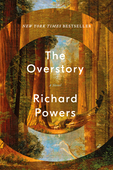 This book is brilliant. It celebrates the wonder of trees and the hopefulness of humanity. It also nails the way we’re destroying the planet and our head-in-the-sand denial of our complicity in this destruction. The situation we’re facing is laid out in The Overstory so convincingly it was sobering in the extreme – but also strangely refreshing. As Nathaniel Rich sums it up in the June issue of The Atlantic:
This book is brilliant. It celebrates the wonder of trees and the hopefulness of humanity. It also nails the way we’re destroying the planet and our head-in-the-sand denial of our complicity in this destruction. The situation we’re facing is laid out in The Overstory so convincingly it was sobering in the extreme – but also strangely refreshing. As Nathaniel Rich sums it up in the June issue of The Atlantic:
‘It is easier, politically, to claim scientific murkiness than to tell the truth: They [the vast majority of people] value their self-interest over the condition of the world their grandchildren will grow up in. Whether this self-interest is venal or foolish is irrelevant. It’s human nature. And that raises a more difficult question: not whether we should take action, but how to come to terms with the fact that our species has proved itself incapable of doing so.’
The Overstory is an issues-driven book, but the characters and their lives are in no way secondary. Without these vividly drawn people, the beating heart of this novel would be lost. Computer-game entrepreneur, Neelay Mehta, is one of nine main characters of the novel who pull at our heartstrings. He was paralysed in childhood in a tree-climbing accident, and says of the virtual worlds he’s invented (and which reflect ours), ‘We have a Midas problem … There’s no endgame, just a stagnant pyramiding scheme. Endless, pointless prosperity.’ Field biologist, Patricia Westerford, is sage in her assessment that trees are like people — social creatures that care for one another, communicate, learn, trade goods and services; and despite lacking a brain, are quite ‘aware’. Adam, the psychologist, says, ‘The best arguments in the world won’t change a person’s mind. The only thing that can do that is a good story.’ Powers’ story is a good one, and may well change minds (and I hope so). It’s made me wish that trees could speak or scream – so they could push us to reverse our planet’s destruction.
Penguin Books $32.99
Call Me by Your Name by André Acima
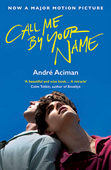 Seventeen-year-old Elio and his father’s 24-year-old houseguest Oliver get together one summer in the 1980s on the Italian Riviera. They’re having sex when Oliver asks Elio to ‘Call me by your name and I’ll call you by mine,’ (which Elio does). Elio then thinks, ‘as soon as I said my own name as though it were his, took me to a realm I’ve never shared with anyone in my life before, or since.’ I didn’t really get the romance behind this name calling, or understand why it would be thrilling. It seemed at worst banal and at best contrived. But then I thought, when you’re 17 and in love or lust, you might construe all sorts of mawkish behaviour as breathtaking, and perhaps capturing this tendency was the cleverness of this novel and is why it has been so acclaimed. The two men come into contact only a few times over the course of their lives – and only once back in Italy where their romance had blossomed. These meetings allow the pair a reckoning of sorts — a context in which to to say the relationship mattered. The meetings also show how memory can hallow intimacy and conflate time, so that ‘Twenty years was yesterday, and yesterday was just earlier, and morning seemed light-years away.’ I liked the book well enough to maybe watch the DVD some time. Here’s a quote: ‘Time makes us sentimental. Perhaps, in the end, it is because of time that we suffer.’
Seventeen-year-old Elio and his father’s 24-year-old houseguest Oliver get together one summer in the 1980s on the Italian Riviera. They’re having sex when Oliver asks Elio to ‘Call me by your name and I’ll call you by mine,’ (which Elio does). Elio then thinks, ‘as soon as I said my own name as though it were his, took me to a realm I’ve never shared with anyone in my life before, or since.’ I didn’t really get the romance behind this name calling, or understand why it would be thrilling. It seemed at worst banal and at best contrived. But then I thought, when you’re 17 and in love or lust, you might construe all sorts of mawkish behaviour as breathtaking, and perhaps capturing this tendency was the cleverness of this novel and is why it has been so acclaimed. The two men come into contact only a few times over the course of their lives – and only once back in Italy where their romance had blossomed. These meetings allow the pair a reckoning of sorts — a context in which to to say the relationship mattered. The meetings also show how memory can hallow intimacy and conflate time, so that ‘Twenty years was yesterday, and yesterday was just earlier, and morning seemed light-years away.’ I liked the book well enough to maybe watch the DVD some time. Here’s a quote: ‘Time makes us sentimental. Perhaps, in the end, it is because of time that we suffer.’
Allen & Unwin, $19.95

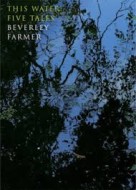


Recent Comments